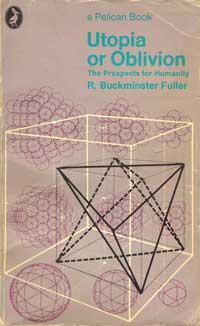
Buckminster Fuller
1969.
British TV viewers may not realize that Buckminster Fuller was the subject of the very first science programme on BBC2, broadcast in April, 1964. He recalls this here amongst a torrent of reminiscences, reckonings and predictions, composing a brilliant, compressed guide to his ideas.
Contents discussed elsewhere in The Fuller Map include:
The essay that gives the book its title is another key text:
"The present top-priority world problem to be solved may be summarized as how to triple, swiftly, safely, and satisfyingly, the overall performances per kilos, kilowatts, and man-hours of the world's comprehensively invested resources of elements, energy, time, and intelligence. To do so will render those resources - which at the present uncoordinated, happenstance, design level can support only 44 per cent of humanity - capable of supporting 100 per cent of humanity's increasing population at higher standards of living than any human minority or single individual has ever known or dreamed of and will thus eliminate the cause of war and its weapons' frustrating diversion of productivity from the support of all mankind." (p.334)
In one of the essays and talks collected here, The Music of the New Life, Fuller has flattering things to say about musicians:
"I'd say that my feelings about musicians is that they do gear their senses realistlcally with their theory. And I have a feeling that in music, man may be able to deal with the new life much more effectively than science has been dealing with the newborn life. All phenomena are generalizable into frequency language, and music provides sensorial-range frequency and amplitude modulating." (p.32)
This estimation escalates later:
"Fortified with a spontaneous awareness of general systems theory as manifest in orchestral composition and conductance, music education teachers may be more able to comprehend and programme computers with innately superior competence in such functioning than that possessed by professional mathematicians." (p.54)
Well, we'll do our best.
© Paul Taylor 2006